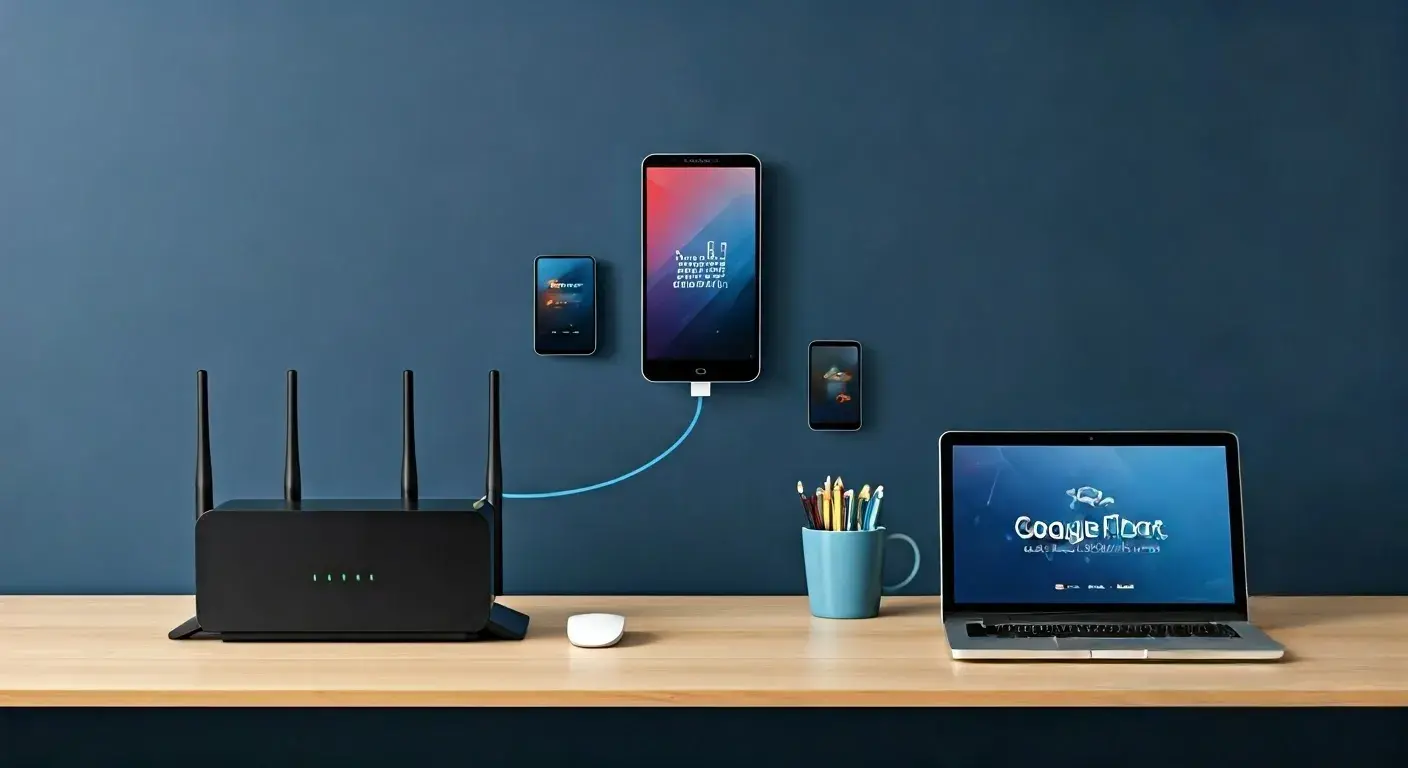Reliable Fiber Internet Solutions for Business Growth

In today's world, having a dependable internet connection is very important for business success. Fibre internet has become a key technology. It gives businesses the speed and reliability they need to succeed. This blog post will look at the benefits of fiber internet, important things to think about, and how to use these solutions. This will help businesses make smart choices about their internet needs.
Understanding Fiber Internet for Business
Fiber internet has changed how businesses work. It offers speed and reliability that regular internet services often can’t keep up with. Instead of using copper wires, fiber internet sends data using light signals through thin, flexible glass fibers. This leads to much faster speeds and better bandwidth capacity.
This new technology helps businesses boost productivity, improve communication, and find new chances to grow with efficient wifi. By learning the basics of fiber internet and how it affects business, you can make smart choices to help your company progress in today’s digital world.
The Basics of Fiber Internet Technology
Fiber internet is better than traditional copper cable internet because it sends data as light waves instead of electrical signals. This change is what makes it faster and provides higher speeds and more reliable connections. Light waves move quicker through fiber optic cables, which are made of thin glass or plastic strands. This allows for much higher data transfer rates.
Copper cable can pick up interference from other signals and lose quality over long distances. In contrast, a fiber network is much less affected by these problems. As a result, fiber internet can keep high speeds and steady performance over longer distances. This means it gives businesses a more stable and reliable connection.
Switching from electrical signals to light waves is a big change in internet technology. This move has led to faster internet speeds, more bandwidth, and better reliability. Therefore, fiber internet is the best choice for businesses that want to stay ahead of the competition.
Benefits of Fiber Internet for Businesses
Fiber internet has many benefits compared to regular internet, including important security features. This makes it a smart choice for businesses that want to improve their work and stay ahead of the competition. Here are some key advantages:
-
Higher Bandwidth: Fiber optic cables have a much higher bandwidth than regular copper wires. This allows fiber internet to handle more data. As a result, you get smooth and steady connectivity.
-
Symmetrical Internet Speeds: In contrast to traditional internet that usually focuses on download speeds, fiber internet offers symmetrical speeds. This means uploading and downloading are at equal speeds. This is important for businesses that often share large files, have video calls, or use online applications.
-
Fast Upload Speeds: With fast upload speeds, businesses can quickly share presentations, work on large files, and back up data to the cloud without delays. This easy sharing helps increase productivity and makes work processes smoother.
Selecting the Right Fiber Internet Provider
Choosing the right fiber internet provider is very important for businesses. This helps them get the best out of high-speed internet. Many providers offer different plans and services. So, it's crucial to look closely at what your business needs and find a provider that fits those needs.
You should consider things like network coverage, speed choices, reliability, customer support, and pricing. It is vital to check all these factors carefully before deciding. By researching and comparing different providers, you can pick one that supports your business goals and helps it grow.
Key Factors to Consider
When choosing fiber internet for your business, you need to think about a few important things. First, ask about the provider's limited availability and coverage in your area. Fiber internet may not be available everywhere.
Next, while many providers claim to offer high speeds for email, ask about the actual speeds you can expect, especially during busy times. A good provider should keep stable service even when many people are using the internet.
Finally, check the provider's contract details. This includes pricing, data limits, and customer support options. Look for a provider that has clear pricing, flexible contracts, and good customer support. This will help you have an easy and smooth experience.
Comparing Fiber Internet Providers in the United States
With numerous internet service providers offering business fiber internet solutions, it's essential to compare their offerings before making a decision. Several leading providers in the United States consistently rank high in terms of network reliability, speed, and customer satisfaction.
It's important to note that pricing and internet speeds may vary depending on your location and the specific plan you choose. Be sure to contact the provider directly to confirm availability and pricing in your area.
Implementing Fiber Internet Solutions
Implementing fiber internet for your business takes good planning and execution. This helps you get the most benefits. Start by looking at how you currently use the internet. Find places where faster speeds or more bandwidth could help your work. Then, research good fiber internet providers near you that offer separate plans. Compare what they offer, looking at speed, reliability, customer support, and pricing.
After you choose a provider, work with them to set up an installation appointment. The installation usually means running fiber optic cable from the street to your business. It should not disturb your daily operations too much.
Planning and Installation Process
When you plan to install business fiber plans for internet, think about your business now and in the future. Consider how many devices will connect, what applications you use, and your chances for growth. Picking a solution that can grow with you will make it easy to increase your bandwidth as your business gets bigger.
The installation process is usually simple. A skilled technician from your provider will run a fiber optic cable from the main point to a special device called an optical network terminal (ONT) at your location. This ONT changes light signals into electrical signals that your devices understand.
A compatible gateway, which is often a modem and router in one, connects to the ONT and sets up your local area network (LAN). This lets many devices connect to the internet. It is important to choose a gateway that matches the speeds of your fiber internet plan so you get the best performance.
Ensuring Smooth Transition to Fiber Internet
Transitioning to fiber internet should be easy and cause little downtime for your business. Before installation, back up all important data. Make sure you don’t lose anything valuable during the switch. You can back up to an external hard drive, cloud storage, or another safe place.
Think about having a backup internet connection. This will help if there are any service interruptions during or after the installation. You might keep your old internet connection for a bit longer or set up a wireless backup.
Finally, if your business uses a virtual private network (VPN), check with your provider. Make sure your VPN works well with your new fiber internet connection. Some VPNs may need changes to work best with faster internet speeds. By taking these steps, you can reduce workflow disruptions and enjoy a smooth transition to your new high-speed internet service.
Enhancing Business Operations with Fiber Internet
Fiber internet helps businesses work better in many ways, especially when it comes to business internet solutions. It increases efficiency, boosts productivity, and improves experiences for both employees and customers. With much faster speeds and better bandwidth, fiber internet allows businesses to use many technologies that were hard to access or slow with regular internet.
It supports smooth video calls, easy cloud computing, large file transfers, and data-heavy apps. Fiber internet and the smart home manager app open up chances for businesses to improve their workflows, work together more easily, and stay ahead in today’s online world.
Boosting Productivity and Efficiency
One major benefit of fiber internet for businesses is how it greatly increases productivity and efficiency. Fiber optic internet is much faster than traditional internet. This means quicker download speeds, lower latency, and a smoother online experience.
Tasks that used to take a long time, like downloading or uploading large files, streaming high-definition videos, or backing up data, can now be done quickly, thanks to faster upload speed. These faster speeds mean less waiting time, simpler workflows, and higher productivity since employees can complete more work in less time.
Additionally, fiber internet often reaches gig speeds. This allows businesses to manage even their toughest tasks without lag or performance problems. With better performance, employees can concentrate on their main jobs without distractions. This boosts their output and helps create a more productive work atmosphere.
Supporting Remote Work and Cloud Computing
Fiber internet is very important for remote work. It offers the speed, bandwidth, and reliability that people need for a smooth experience. Its symmetric internet speed means you get quick access to the same fast upload and download speeds. This is key for remote workers who often share files and join video calls.
Fiber internet connections are steady and reliable. This helps remote workers work well with their team and access cloud applications easily. They won’t have to deal with delays or disruptions. This kind of smooth connection is vital for staying productive when working from home.
Moreover, fiber internet has a strong setup and higher bandwidth, making it perfect for businesses that rely on cloud computing and transfer large amounts of data. Since their data is stored online, cloud applications need a fast and stable internet connection to work well. Fiber internet provides this speed and reliability, allowing businesses to use cloud computing fully without worrying about any performance problems.
Conclusion
In conclusion, investing in reliable fiber internet solutions can really help your business grow. It boosts productivity, supports remote work, and allows for better cloud computing. The technology behind fiber internet brings many benefits, making it essential for modern operations. If you choose the right fiber internet provider and have a smooth transition, you will see improved operations. Using fiber internet will enhance your business connectivity and lead to future growth and success. Upgrade your business with fiber internet today to gain a competitive edge in the digital world.





